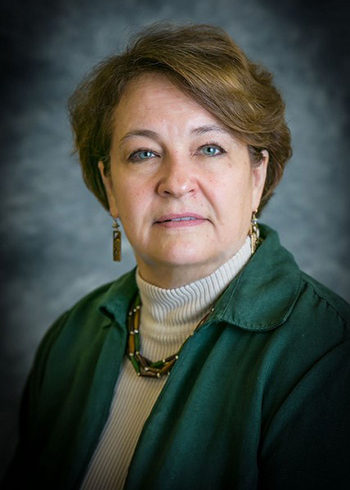CSU professor is developing a virtual training guide for care givers
Research has shown that Alzheimer’s patients often still feel like the same person they have alway been mothers, business owners or veterans, for example and they expect others to treat them as such. But if care providers treat them mere as patients or frail people, their cognitive impairment can make it difficult for them to express frustration, which can lead to agitation or depression.
One of Cleveland State University researcher is hoping to solve this problem by improving interactions between Alzheimer’s patients and their care givers with new computer technology.
Dr. Linda Francis,  associate professor of sociology at CSU, is developing a virtual interaction computer guide that trains care providers to interact with Alzheimer’s patient based on their affective rather than cognitive memory.
associate professor of sociology at CSU, is developing a virtual interaction computer guide that trains care providers to interact with Alzheimer’s patient based on their affective rather than cognitive memory.
“Affective memory includes a person’s self-esteem, and is crucial to emotional wellbeing. But it is not well supported by the structure of residential care,” Francis says. “We are creating a computer technology that will incorporate each resident’s unique affective memory profile and stimulate supportive interaction based on that profile.”
This virtual training guide will provide staff the tools to improve the quality of their interaction with cognitively impaired residents, potentially enhancing engagement, responsiveness and quality of life, Francis says. The hope is the technology will help prevent depression among Alzheimer’s patients and possibly reduce the need for alliance on psychotropic medication.
Dr. Francis will collect self-sentiment profiles of residents of dementia unit in a local nursing facility. With the data collected, she plans to program artificially intelligent software that can respond to emotional, as well as cognitive and behavioral cues. The program will then be used to stimulate affective rather than cognitive interaction.
 “If the project is successful, we will have a potential intervention to improve quality of life among persons with Alzheimer’s, a possible approach to computer learning of emotional cues, and an important theoretical model of affective self,” Dr. Francis says.
“If the project is successful, we will have a potential intervention to improve quality of life among persons with Alzheimer’s, a possible approach to computer learning of emotional cues, and an important theoretical model of affective self,” Dr. Francis says.
Alzheimer’s is the sixth leading cause of death in the united states. More than 5 million Americans are living with Alzheimer’s disease. By 2050 this may number more than triple. In Northeast Ohio alone more than 50,ooo people are living with Alzheimer’s.
It is no surprise The Alzheimer’s Association is particularly interested in Francis’ research and is funding the project with $150,000.
“The only way we will achieve a world without Alzheimer’s is through research,” says Nancy Udelson, president and CEO of the Cleveland Area Chapter. “Funding Dr. Francis not only supports this critical project, but is part of a broader Alzheimer’s Association effort to keep the best and brightest scientist working on this disease.”
Next Steps: Dr. Francis’s virtual training tool for care providers is slated to launch in the fall.
Learn More: For more information about Alzheimer’s research, visit alz.org
The IoT collaborative (IOTC), a partnership between Case Western Reserve University and Cleveland State University, is leading change as an engaged and socially responsible partners in the development and advancement of IoT.

